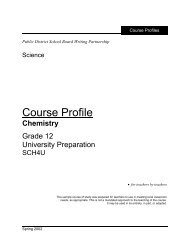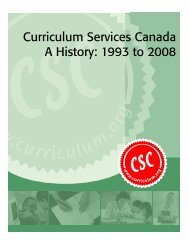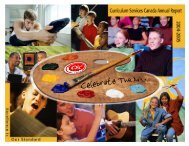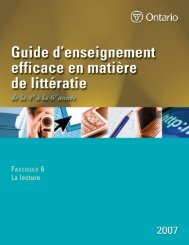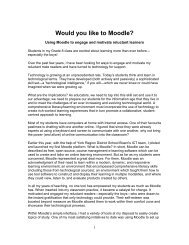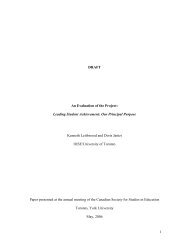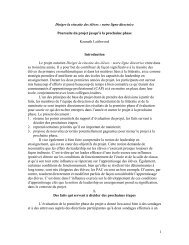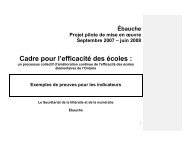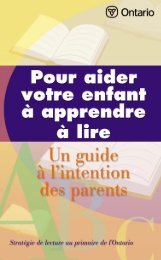Course Profile - Curriculum Services Canada
Course Profile - Curriculum Services Canada
Course Profile - Curriculum Services Canada
You also want an ePaper? Increase the reach of your titles
YUMPU automatically turns print PDFs into web optimized ePapers that Google loves.
• Has anything the main character said or done caused you to question your own code of values?<br />
• Does anyone in the play act as a mentor to, or “moral compass” for, the main character?<br />
• What scene would you like to see dramatized and why? Which scene do you think would be most<br />
challenging to stage?<br />
• What alternative settings for this play would you suggest for a new staging?<br />
• What feelings did you experience as you attempted to stage your scene?<br />
• Once you adopted a particular role, did your feelings regarding the character change in any way?<br />
If so, how? If not, why not?<br />
• What actors do you think would be effective casting choices for this play and why?<br />
• After watching one, two, or three film versions of the play, what adds or detracts from your<br />
understanding of the play?<br />
• What directorial choices do you feel were strong? Which were weak and why?<br />
Assessment/Evaluation<br />
Formative Assessment:<br />
• Reader response journals for completion and thoroughness of reflection (see Appendix 2.1)<br />
Accommodations<br />
• Number and length of reflections may be reduced<br />
• A scribe may be provided<br />
Resources<br />
“Reader Response Theory and the English <strong>Curriculum</strong>” in The English Journal, 1994, pp. 37-44, Robert<br />
E. Probst<br />
Tompkins, Jane, ed. Reader Response Criticism: From Formalism to Post-Structuralism.<br />
Activity 3: Playing with Words: The Effectiveness of Language<br />
Time: 90 minutes, interspersed<br />
Description<br />
Students are challenged to explore the diction and nuances of language employed by playwrights to<br />
emphasize characterization and themes.<br />
Strand(s) and Expectations<br />
Ontario Catholic School Graduate Expectations:<br />
1a - illustrate a basic understanding of the saving story of our Christian faith;<br />
3a - recognize there is more grace in our world than sin and that hope is essential in facing all<br />
challenges;<br />
4b - demonstrate flexibility and adaptability.<br />
Strand(s): Literature Studies and Reading, Language, Media<br />
Overall Expectations:<br />
L1V. 02D - demonstrate an understanding of the elements of a variety of literary and informational<br />
forms, with a focus on plays, short stories, and short essays;<br />
L1V.03B - identify and explain the effect of specific elements of style in a variety of literary and<br />
informational texts;<br />
Unit 4 - Page 7<br />
•English - Academic



